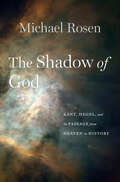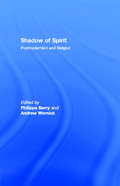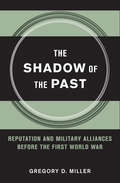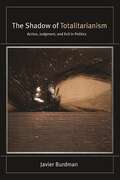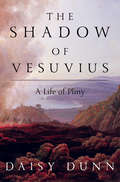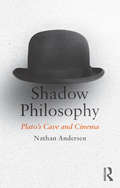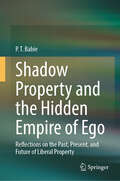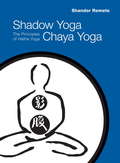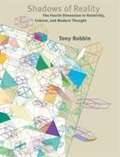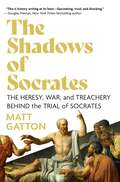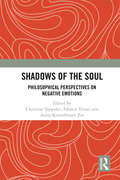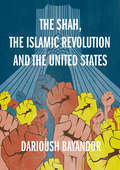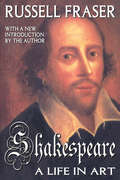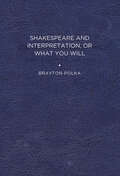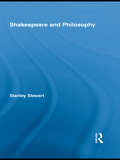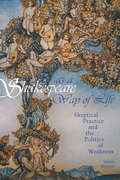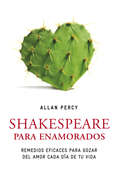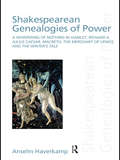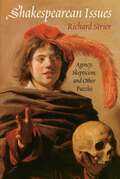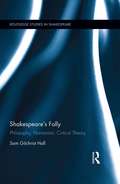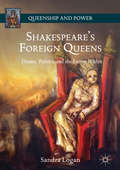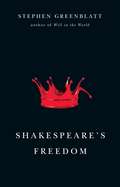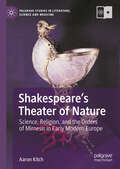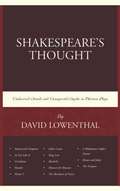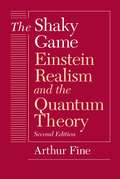- Table View
- List View
The Shadow of God: Kant, Hegel, and the Passage from Heaven to History
by Michael RosenA bold and beautifully written exploration of the “afterlife” of God, showing how apparently secular habits of mind in fact retain the structure of religious thought.Once in the West, our lives were bounded by religion. Then we were guided out of the darkness of faith, we are often told, by the cold light of science and reason. To be modern was to reject the religious for the secular and rational. In a bold retelling of philosophical history, Michael Rosen explains the limits of this story, showing that many modern and apparently secular ways of seeing the world were in fact profoundly shaped by religion.The key thinkers, Rosen argues, were the German Idealists, as they sought to reconcile reason and religion. It was central to Kant’s philosophy that, if God is both just and assigns us to heaven or hell for eternity, we must know what is required of us and be able to choose freely. In trying to live moral lives, Kant argued, we are engaged in a collective enterprise as members of a “Church invisible” working together to achieve justice in history. As later Idealists moved away from Kant’s ideas about personal immortality, this idea of “historical immortality” took center stage. Through social projects that outlive us we maintain a kind of presence after death. Conceptions of historical immortality moved not just into the universalistic ideologies of liberalism and revolutionary socialism but into nationalist and racist doctrines that opposed them. But how, after global wars and genocide, can we retain faith in any conception of shared moral progress and, if not, what is to become of the idea of historical immortality? That is our present predicament.A seamless blend of philosophy and intellectual history, The Shadow of God is a profound exploration of secular modernity’s theistic inheritance.
Shadow of Spirit: Postmodernism and Religion
by Philippa Berry Andrew WernickBy illuminating the striking affinity between the most innovative aspects of postmodern thought and religious mystical discourse, Shadow of Spirit challenges the long established assumption that western thought is committed to nihilism. This collection of essays by internationally recognised scholars explores the implications of the fascination with the `sacred', `divine' or `infinite' which characterizes much contemporary thought. It shows how these concerns have surfaced in the work of Derrida, Baudrillard, Lyotard, Kristeva, Irigaray and others. Examining the connection between this postmodern `turn' and the current search for a new discourse of ethics and politics, it also stresses the contribution made by feminist thought to this unexpected intellectual direction.
The Shadow of the Past: Reputation and Military Alliances before the First World War (Cornell Studies in Security Affairs)
by Gregory D. MillerIn The Shadow of the Past, Gregory D. Miller examines the role that reputation plays in international politics, emphasizing the importance of reliability—confidence that, based on past political actions, a country will make good on its promises—in the formation of military alliances. Challenging recent scholarship that focuses on the importance of credibility—a state’s reputation for following through on its threats—Miller finds that reliable states have much greater freedom in forming alliances than those that invest resources in building military force but then use it inconsistently. To explore the formation and maintenance of alliances based on reputation, Miller draws on insights from both political science and business theory to track the evolution of great power relations before the First World War. He starts with the British decision to abandon "splendid isolation" in 1900 and examines three crises—the First Moroccan Crisis (1905–6), the Bosnia-Herzegovina Crisis (1908–9), and the Agadir Crisis (1911)—leading up to the war. He determines that states with a reputation for being a reliable ally have an easier time finding other reliable allies, and have greater autonomy within their alliances, than do states with a reputation for unreliability. Further, a history of reliability carries long-term benefits, as states tend not to lose allies even when their reputation declines.
The Shadow of Totalitarianism: Action, Judgment, and Evil in Politics (SUNY series, Intersections: Philosophy and Critical Theory)
by Javier BurdmanThe Shadow of Totalitarianism develops a new way to think about the problem of evil in politics. Beginning with the commonplace idea that the rise of totalitarianism in the twentieth century marked the emergence of a new form of evil, Javier Burdman finds early seeds of thinking about this form in Immanuel Kant's moral philosophy. Far from being an isolated object of inquiry, evil, Burdman argues, has long shaped and been central to philosophical understandings of political action and judgment. Systematically analyzing the relationship between evil, action, and judgment in the work of Kant, Hannah Arendt, and Jean-François Lyotard, The Shadow of Totalitarianism aligns evil in politics with a desire for moral certainty, hence the emphasis on the need to accept and affirm uncertainty in current ethical theories. The careful philosophical analysis through which Burdman develops this inquiry contributes to a better understanding of some of the theoretical complexities involved in the problem of evil and provides conceptual tools with which to approach it.
The Shadow of Vesuvius: A Life Of Pliny
by Daisy Dunn“A wonderfully rich, witty, insightful, and wide-ranging portrait of the two Plinys and their world.”—Sarah Bakewell, author of How to Live When Pliny the Elder perished at Stabiae during the eruption of Vesuvius in 79 AD, he left behind an enormous compendium of knowledge, his thirty-seven-volume Natural History, and a teenaged nephew who revered him as a father. Grieving his loss, Pliny the Younger inherited the Elder’s notebooks—filled with pearls of wisdom—and his legacy. At its heart, The Shadow of Vesuvius is a literary biography of the younger man, who would grow up to become a lawyer, senator, poet, collector of villas, and chronicler of the Roman Empire from the dire days of terror under Emperor Domitian to the gentler times of Emperor Trajan. A biography that will appeal to lovers of Mary Beard books, it is also a moving narrative about the profound influence of a father figure on his adopted son. Interweaving the younger Pliny’s Letters with extracts from the Elder’s Natural History, Daisy Dunn paints a vivid, compellingly readable portrait of two of antiquity’s greatest minds.
Shadow Philosophy: Plato's Cave And Cinema
by Nathan AndersenShadow Philosophy: Plato’s Cave and Cinema is an accessible and exciting new contribution to film-philosophy, which shows that to take film seriously is also to engage with the fundamental questions of philosophy. Nathan Andersen brings Stanley Kubrick’s film A Clockwork Orange into philosophical conversation with Plato’s Republic, comparing their contributions to themes such as the nature of experience and meaning, the character of justice, the contrast between appearance and reality, the importance of art, and the impact of images. At the heart of the book is a novel account of the analogy between Plato’s allegory of the cave and cinema, developed in conjunction with a provocative interpretation of the most powerful image from A Clockwork Orange, in which the lead character is strapped to a chair and forced to watch violent films. Key features of the book include: a comprehensive bibliography of suggested readings on Plato, on film, on philosophy, and on the philosophy of film a list of suggested films that can be explored following the approach in this book, including brief descriptions of each film, and suggestions regarding its philosophical implications a summary of Plato’s Republic, book by book, highlighting both dramatic context and subject matter. Offering a close reading of the controversial classic film A Clockwork Orange, and an introductory account of the central themes of the philosophical classic The Republic, this book will be of interest to both scholars and students of philosophy and film, as well as to readers of Plato and fans of Stanley Kubrick.
Shadow Property and the Hidden Empire of Ego: Reflections on the Past, Present, and Future of Liberal Property
by P. T. BabieThis book explores the nature of liberal property in the twenty-first century. It contains three parts. The first examines how we have arrived at the liberal concept of property—what many scholars call the 'bundle of rights' metaphor of property. This part argues that the liberal conception embodied in the bundle of rights metaphor is really a way of masking or hiding what property really is: an exercise of ego about the way goods and resources are used. Or, put another way, it enshrines the ability to suit personal preferences about the way things are used, rather than what might better serve the common good. The second part provides an important modern critique of the bundle of rights metaphor—that, in addition to being a collection of rights, property is also about social relations that exist between people. Through these social relations, which are contained in law, any decision that a person makes about how to use a good or resource necessarily carries implications for others. While those effects can be both positive and negative, we are much more familiar with the latter, including most of the global challenges we face today—climate change, extreme weather, global hunger, and global poverty. Taking those global challenges as its focus, the final part of the book suggests possible futures of property in which it is reconceived in ways that reduce the potential for negative impacts on others.
Shadow Yoga, Chaya Yoga
by Shandor RemeteIn Shadow Yoga, Chaya Yoga, author Shandor Remete shows how to utilize yoga to enhance all aspects of physical and spiritual health. Focusing specifically on the hatha tradition, the book delves deep into original Sanskrit texts, explaining the theoretical foundation of yoga in clear, encouraging language. Remete describes the "shadows" noted by classical yoga teachers that block the student, and shows ways to move beyond them. The book covers the key concepts of traditional yoga--the marmas, chakras, vayus (sources of energy), and nadis (flows of energy through the body)--before turning to the yogic techniques that improve their condition and functioning--asana (poses), nauli (abdominal exercises), pranayama (breathing), mudra (gestures), and laya (absorptions). It closes with illustrated sequences of the most important asanas. Shadow Yoga also discusses various little-understood, oft-neglected aspects of yogic training, such as the role of marma points (acupuncture-like energy points) and the influence of the zodiac. Detailed drawings of the body's energy system and its links to these elemental and planetary forces provide a visual guide to these largely unknown areas of yoga. This knowledge, considered essential in Indian yogic traditions, has been almost entirely lost in modern Western schools of yoga. Author Remete restores that information in this beautifully designed book.From the Trade Paperback edition.
Shadows of Reality: The Fourth Dimension in Relativity, Cubism, and Modern Thought
by Tony RobbinIn this insightful book, which is a revisionist math history as well as a revisionist art history, Tony Robbin, well known for his innovative computer visualizations of hyperspace, investigates different models of the fourth dimension and how these are applied in art and physics. Robbin explores the distinction between the slicing, or Flatland, model and the projection, or shadow, model. He compares the history of these two models and their uses and misuses in popular discussions. Robbin breaks new ground with his original argument that Picasso used the projection model to invent cubism, and that Minkowski had four-dimensional projective geometry in mind when he structured special relativity. The discussion is brought to the present with an exposition of the projection model in the most creative ideas about space in contemporary mathematics such as twisters, quasicrystals, and quantum topology. Robbin clarifies these esoteric concepts with understandable drawings and diagrams. Robbin proposes that the powerful role of projective geometry in the development of current mathematical ideas has been long overlooked and that our attachment to the slicing model is essentially a conceptual block that hinders progress in understanding contemporary models of spacetime. He offers a fascinating review of how projective ideas are the source of some of today's most exciting developments in art, math, physics, and computer visualization.
The Shadows of Socrates: The Heresy, War, and Treachery Behind the Trial of Socrates
by Matt GattonThe death of Socrates may be the most famous unsolved murder in history. Set during the Peloponnesian War, this narrative solves that mystery, revealing for the first time how the philosopher was set up, who did it, and why.The influence of the ancient Greek philosopher Socrates has been profound. Even today, over two thousand years after his death, he remains one of the most renowned humans to have ever lived, occupying a stratum with the likes of Buddha, Jesus, Muhammed, Confucius, and Moses. It may not be too much to say that Socrates is the single most recognizable name in the history of all humanity. The death of Socrates is, in some ways, the most famous unsolved murder mystery in history. This book will solve the mystery, revealing for the first time how he was set up, who did it, and why. What follows is not a philosophical tract but something closer to a novel—made all the more compelling because it&’s true. This is a real-life whodunit intertwined with a long running war, rivalry, sex addiction, betrayal, sedition, starvation, and epic bravery. Socrates was the most rational of men living in the most irrational of times. There is another side to this story: impiety, lack of reverence for the gods, was a religious crime. From the perspective of the religious authorities of the time, the charge of impiety against Socrates was warranted, his trial just, and the penalty appropriate. The priests did not tolerate scrutiny, even in the form of philosophical critique. To understand what happened and how it happened, we have to come to terms with the motives of the priests, and as importantly, Socrates&’ motives in provoking them. His trial is perhaps first, but not last, great battle between philosophy and religion. The repercussions of this ancient epic apply equally to the West today, as Athens also endured pendulum swings between democracy and oligarchy—always with bloodshed, and never with Socrates&’s approval.
Shadows of the Soul: Philosophical Perspectives on Negative Emotions
by Christine Tappolet Fabrice Teroni Anita Konzelmann ZivNegative emotions are familiar enough, but they have rarely been a topic of study in their own right. This volume brings together fourteen chapters on negative emotions, written in a highly accessible style for non-specialists and specialists alike. It starts with chapters on general issues raised by negative emotions, such as the nature of valence, the theoretical implications of nasty emotions, the role of negative emotions in fiction, as well as the puzzles raised by ambivalent and mixed emotions. The second part of the volume consists of studies of specific emotional phenomena, ranging from the emotion of being moved and the sense of uncanniness to jealousy, hatred, shame, contempt, anxiety, and grief.
The Shah, the Islamic Revolution and the United States
by Darioush BayandorThe Islamic Revolution in 1979 transformed Iranian society and reshaped the political landscape of the Middle East. Four decades later, Darioush Bayandor draws upon heretofore untapped archival evidence to reexamine the complex domestic and international dynamics that led to the Revolution. Beginning with the socioeconomic transformation of the 1960s, this book follows the Shah’s rule through the 1970s, tracing the emergence of opposition movements, the Shah’s blunders and miscalculations, the influence of the post-Vietnam zeitgeist and the role of the Carter administration. The Shah, the Islamic Revolution and the United States offers new revelations about how Iran was thrown into chaos and an ailing ruler lost control, with consequences that still reverberate today.
Shakespeare: A Life in Art
by Russell FraserShakespeare: A Life in Art brings together in a single volume Fraser's previously published two-volume biography (Young Shakespeare, 1988, and Shakespeare: The Later Years, 1992). This volume includes a new introduction, which looks back on the author's lifelong commitment to Shakespeare's work and seeks to find the pattern in his carpet.Fraser's approach places Shakespeare's work first but shows how the life and art interpenetrate, like the yolk and white of one shell. What Shakespeare was doing in Stratford and London underlies what he was writing, or more exactly, the two flow together. Most of the book is devoted to Shakespeare the man and artist, but it simultaneously throws light on his literary and personal relations with contemporaries such as Jonson, Marlowe, and others known as the University Wits. His experience as an actor and man of theater is absorbingly recounted here, as well as his relations to well-born patrons like the Earl of Southampton and Henry Carey, Lord Hunsdon (England's Lord Chamberlain). In 1603 when James I ascended the throne, the Chamberlain's Men became the King's Men, passing under the sovereign's protection. How Shakespeare responded to his ambiguous role--he was both servant to the great and their remorseless critic--is another of Fraser's subjects. In short, Fraser's principal purpose is to advance our understanding of Shakespeare, at the same time throwing light on the work of the man who of all modern, and perhaps ancient poets had the largest and most comprehensive soul. John Dryden, Shakespeare's first great critic, said that, and Fraser tries to estimate what he meant.
Shakespeare and Interpretation, or What You Will
by Brayton PolkaBrayton Polka takes both a textual and theoretical approach to seven plays of Shakespeare: Macbeth, Othello, Twelfth Night, All’s Well That Ends Well, Julius Caesar, Troilus and Cressida, and Hamlet. He calls upon the Bible and the ideas of major European thinkers, above all, Kierkegaard and Spinoza, to argue that the concept of interpretation that underlies both Shakespeare’s plays and our own lives as moderns is the golden rule of the Bible: the command to love your neighbor as yourself. What you will (the alternative title of Twelfth Night ) thus captures the idea that interpretation is the very act by which we constitute our lives. For it is only in willing what others will—in loving relationships—that we enact a concept of interpretation that is adequate to our lives. Polka argues that it is the aim of Shakespeare, when representing the ancient world in plays like Julius Caesar and Troilus and Cressida, and also in his long narrative poem “The Rape of Lucrece,” to dramatize the fundamental differences between ancient (pagan) values and modern (biblical) values or between what he articulates as contradiction and paradox. The ancients are fatally destroyed by the contradictions of their lives of which they remain ignorant. In contrast, we moderns in the biblical tradition, like those who figure in Shakespeare’s other works, are responsible for addressing and overcoming the contradictions of our lives through living the interpretive paradox of “what you will,” of treating all human beings as our neighbor. Shakespeare’s comedies and tragedies, notwithstanding their dramatically different form, share this interpretive framework of paradox. As the author shows in his book, texts without interpretation are blind and interpretation without texts is empty. Published by University of Delaware Press. Distributed worldwide by Rutgers University Press.
Shakespeare and Philosophy (Routledge Studies in Shakespeare)
by Stanley StewartTouching on the work of philosophers including Richardson, Kant, Hume, Wittgenstein, Nietzsche, and Dewey, this study examines the history of what philosophers have had to say about "Shakespeare" as a subject of philosophy, from the seventeenth-century to the present. Stewart's volume will be of interest to Shakespeareans, literary critics, and philosophers.
Shakespeare as a Way of Life: Skeptical Practice and the Politics of Weakness
by James KuznerShakespeare as a Way of Life shows how reading Shakespeare helps us to live with epistemological weakness and even to practice this weakness, to make it a way of life. In a series of close readings, Kuzner shows how Hamlet, Lucrece, Othello, The Winter’s Tale, The Tempest, and Timon of Athens, impel us to grapple with basic uncertainties: how we can be free, whether the world is abundant, whether we have met the demands of love and social life.To Kuzner, Shakespeare’s skepticism doesn’t have the enabling potential of Keats’s heroic “negativity capability,” but neither is that skepticism the corrosive disease that necessarily issues in tragedy. While sensitive to both possibilities, Kuzner offers a way to keep negative capability negative while making skepticism livable. Rather than light the way to empowered, liberal subjectivity, Shakespeare’s works demand lasting disorientation, demand that we practice the impractical so as to reshape the frames by which we view and negotiate the world.The act of reading Shakespeare cannot yield the practical value that cognitive scientists and literary critics attribute to it. His work neither clarifies our sense of ourselves, of others, or of the world; nor heartens us about the human capacity for insight and invention; nor sharpens our ability to appreciate and adjudicate complex problems of ethics and politics. Shakespeare’s plays, rather, yield cognitive discomforts, and it is just these discomforts that make them worthwhile.
Shakespeare para enamorados (Genios para la vida cotidiana #Volumen)
by Allan PercyRemedios eficaces para gozar del amor cada día de tu vida. Shakespeare para enamorados es un libro fresco e increíblemente inspirador para los que se toman el amor muy en serio. De entre todos los grandes autores de la literatura universal, ninguno profundizó en los misterios del amor y ha tratado los asuntos del corazón desde una perspectiva tan lúcida como William Shakespeare. Todavía hoy sus obras y poemas son una poderosa herramienta para comprender los insondables secretos de nuestro corazón. Del flechazo al desengaño, del primer beso al amor imposible, del compromiso a los celos, Shakespeare para enamorados saca de los escenarios y de las antologías poéticas la ciencia shakespeariana del amor para iluminar nuestra vida cotidiana y por fin dar respuesta a preguntas como: ¿Por qué hay personas que tienen mala suerte en las relaciones sentimentales? ¿Cómo se cura el mal de amores? ¿Se puede vivir un romance toda la vida? ¿Cuál es el secreto de la seducción? ¿Cómo luchar contra los celos?
Shakespearean Genealogies of Power: A Whispering of Nothing in Hamlet, Richard II, Julius Caesar, Macbeth, The Merchant of Venice, and The Winter’s Tale
by Anselm HaverkampShakespearean Genealogies of Power proposes a new view on Shakespeare’s involvement with the legal sphere: as a visible space between the spheres of politics and law and well able to negotiate legal and political, even constitutional concerns, Shakespeare’s theatre opened up a new perspective on normativity. His plays reflect, even create, "history" in a new sense on the premises of the older conceptions of historical and legal exemplarity: examples, cases, and instances are to be reflected rather than treated as straightforwardly didactic or salvific. Thus, what comes to be recognized, reflected and acknowledged has a disowning, alienating effect, whose enduring aftermath rather than its theatrical immediacy counts and remains effective. In Shakespeare, the law gets hold of its normativity as the problematic efficacy of unsolved – or rarely ever completely solved – problems: on the stage of the theatre, the law has to cope with a mortgage of history rather than with its own success story. The exemplary interplay of critical cultural and legal theory in the twentieth-century – between Carl Schmitt and Hans Kelsen, Walter Benjamin and Ernst Kantorowicz, Hans Blumenberg and Giorgio Agamben, Robert Cover and Niklas Luhmann – found in Shakespeare’s plays its speculative instruments.
Shakespearean Issues: Agency, Skepticism, and Other Puzzles
by Richard StrierIn Shakespearean Issues, Richard Strier has written a set of linked essays bound by a learned view of how to think about Shakespeare’s plays and also how to write literary criticism on them. The essays vary in their foci—from dealing with passages and key lines to dealing with whole plays, and to dealing with multiple plays in thematic conversation with each other. Strier treats the political, social, and philosophical themes of Shakespeare’s plays through recursive and revisionary close reading, revisiting plays from different angles and often contravening prevailing views.Part I focuses on characters. Moments of bad faith, of unconscious self-revelation, and of semi-conscious self-revelation are analyzed, along with the problem of describing characters psychologically and ethically. In an essay on “Happy Hamlet,” the famous melancholy of the prince is questioned, as is the villainy of Rosencrantz and Guildenstern, while another essay asks the reader to reconsider moral judgments and negative assessments of characters who may be flawed but do not seem obviously wicked, such as Edgar and Gloucester in King Lear.Part II moves to systems, arguing that Henry IV, Measure for Measure, and The Merchant of Venice raise doubts about fundamental features of legal systems, such as impartiality, punishments, and respect for contracts. Strier reveals King Lear’s radicalism, analyzing its concentration on poverty and its insistence on the existence and legitimacy of a material substratum to human life. Essays on The Tempest offer original takes on the play’s presentation of coercive power, of civilization and its discontents, and of humanist ideals. Part III turns to religious and epistemological beliefs, with Strier challenging prevailing views of Shakespeare’s relation to both.A culminating reading sees The Winter’s Tale as ultimately affirming the mind’s capacities, and as finding a place for something like religion within the world. Anyone interested in Shakespeare’s plays will find Shakespearean Issues bracing and thought-provoking.
Shakespeare's Folly: Philosophy, Humanism, Critical Theory (Routledge Studies in Shakespeare)
by Sam HallThis study contends that folly is of fundamental importance to the implicit philosophical vision of Shakespeare’s drama. The discourse of folly’s wordplay, jubilant ironies, and vertiginous paradoxes furnish Shakespeare with a way of understanding that lays bare the hypocrisies and absurdities of the serious world. Like Erasmus, More, and Montaigne before him, Shakespeare employs folly as a mode of understanding that does not arrogantly insist upon the veracity of its own claims – a fool’s truth, after all, is spoken by a fool. Yet, as this study demonstrates, Shakespearean folly is not the sole preserve of professional jesters and garrulous clowns, for it is also apparent on a thematic, conceptual, and formal level in virtually all of his plays. Examining canonical histories, comedies, and tragedies, this study is the first to either contextualize Shakespearean folly within European humanist thought, or to argue that Shakespeare’s philosophy of folly is part of a subterranean strand of Western philosophy, which itself reflects upon the folly of the wise. This strand runs from the philosopher-fool Socrates through to Montaigne and on to Nietzsche, but finds its most sustained expression in the Critical Theory of the mid to late twentieth-century, when the self-destructive potential latent in rationality became an historical reality. This book makes a substantial contribution to the fields of Shakespeare, Renaissance humanism, Critical Theory, and Literature and Philosophy. It illustrates, moreover, how rediscovering the philosophical potential of folly may enable us to resist the growing dominance of instrumental thought in the cultural sphere.
Shakespeare’s Foreign Queens: Drama, Politics, And The Enemy Within (Queenship and Power)
by Sandra LoganThis book examines Shakespeare’s depiction of foreign queens as he uses them to reveal and embody tensions within early modern English politics. Linking early modern and contemporary political theory and concerns through the concepts of fragmented identity, hospitality, citizenship, and banishment, Sandra Logan takes up a set of questions not widely addressed by scholars of early modern queenship. How does Shakespeare’s representation of these queens challenge the opposition between friend and enemy that ostensibly defines the context of the political? And how do these queens expose the abusive potential of the sovereign? Focusing on Katherine of Aragon in Henry VIII, Hermione in The Winter’s Tale, Tamora in Titus Andronicus, and Margaret in the first history tetralogy, Logan considers them as means for exploring conditions of vulnerability, alienation, and exclusion common to subjects of every social position, exposing the sovereign himself as the true enemy of the state.
Shakespeare's Freedom
by Stephen GreenblattShakespeare lived in a world of absolutes—of claims for the absolute authority of scripture, monarch, and God, and the authority of fathers over wives and children, the old over the young, and the gentle over the baseborn. With the elegance and verve for which he is well known, Stephen Greenblatt, author of the best-selling Will in the World, shows that Shakespeare was strikingly averse to such absolutes and constantly probed the possibility of freedom from them. Again and again, Shakespeare confounds the designs and pretensions of kings, generals, and churchmen. His aversion to absolutes even leads him to probe the exalted and seemingly limitless passions of his lovers. Greenblatt explores this rich theme by addressing four of Shakespeare’s preoccupations across all the genres in which he worked. He first considers the idea of beauty in Shakespeare’s works, specifically his challenge to the cult of featureless perfection and his interest in distinguishing marks. He then turns to Shakespeare’s interest in murderous hatred, most famously embodied in Shylock but seen also in the character Bernardine in Measure for Measure. Next Greenblatt considers the idea of Shakespearean authority—that is, Shakespeare’s deep sense of the ethical ambiguity of power, including his own. Ultimately, Greenblatt takes up Shakespearean autonomy, in particular the freedom of artists, guided by distinctive forms of perception, to live by their own laws and to claim that their creations are singularly unconstrained. A book that could only have been written by Stephen Greenblatt, Shakespeare’s Freedom is a wholly original and eloquent meditation by the most acclaimed and influential Shakespearean of our time.
Shakespeare’s Theater of Nature: Science, Religion, and the Orders of Mimesis in Early Modern Europe (Palgrave Studies in Literature, Science and Medicine)
by Aaron KitchShakespeare’s Theater of Nature argues that Shakespeare combined art and nature in new ways while experimenting with relations between words, images, and objects as sources of knowledge and pleasure. Shakespeare’s re-centering of nature as a source of theatrical representation in a range of plays follows debates in natural philosophy and theology about how to understand divinity in and through the order of nature (ordo creationis). Early chapters analyze early modern reframing of nature by printed books of botany, cosmology, and history—as well Tudor interludes that center nature as a subject—while later chapters offer readings of eight plays by Shakespeare that draw on classical, medieval, and early modern debates in natural philosophy and theology to create new modes of dramatic mimesis.
Shakespeare's Thought: Unobserved Details And Unsuspected Depths In Thirteen Plays
by David LowenthalApart from the dedicatory poem, this edition adds six new chapters to the original and sets forth under a new title that is a somewhat better guide to these pages than the old one (Shakespeare and the Good Life: Ethics and Politics in Dramatic Form). For attention to detail, I've been inspired by Thomas de Quincey's astonishing claim (in his "On the Knocking on the Door in Macbeth") that absolutely nothing in a Shakespearean play is there by accident.
The Shaky Game: Einstein Realisn and the Quantum Theory
by Arthur FineIn this new edition, Arthur Fine looks at Einstein's philosophy of science and develops his own views on realism. A new Afterword discusses the reaction to Fine's own theory. "What really led Einstein . . . to renounce the new quantum order? For those interested in this question, this book is compulsory reading."—Harvey R. Brown, American Journal of Physics "Fine has successfully combined a historical account of Einstein's philosophical views on quantum mechanics and a discussion of some of the philosophical problems associated with the interpretation of quantum theory with a discussion of some of the contemporary questions concerning realism and antirealism. . . . Clear, thoughtful, [and] well-written."—Allan Franklin, Annals of Science "Attempts, from Einstein's published works and unpublished correspondence, to piece together a coherent picture of 'Einstein realism.' Especially illuminating are the letters between Einstein and fellow realist Schrödinger, as the latter was composing his famous 'Schrödinger-Cat' paper."—Nick Herbert, New Scientist "Beautifully clear. . . . Fine's analysis is penetrating, his own results original and important. . . . The book is a splendid combination of new ways to think about quantum mechanics, about realism, and about Einstein's views of both."—Nancy Cartwright, Isis
